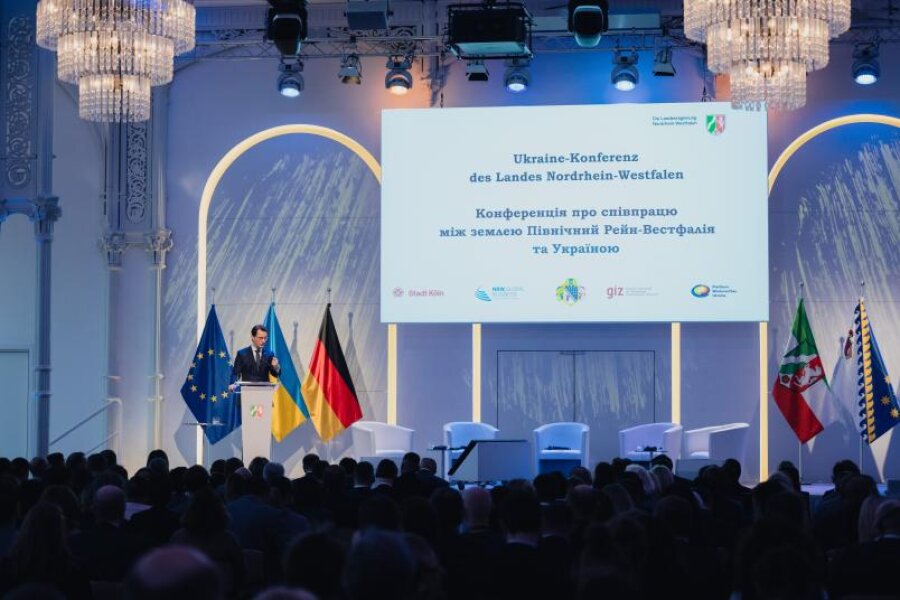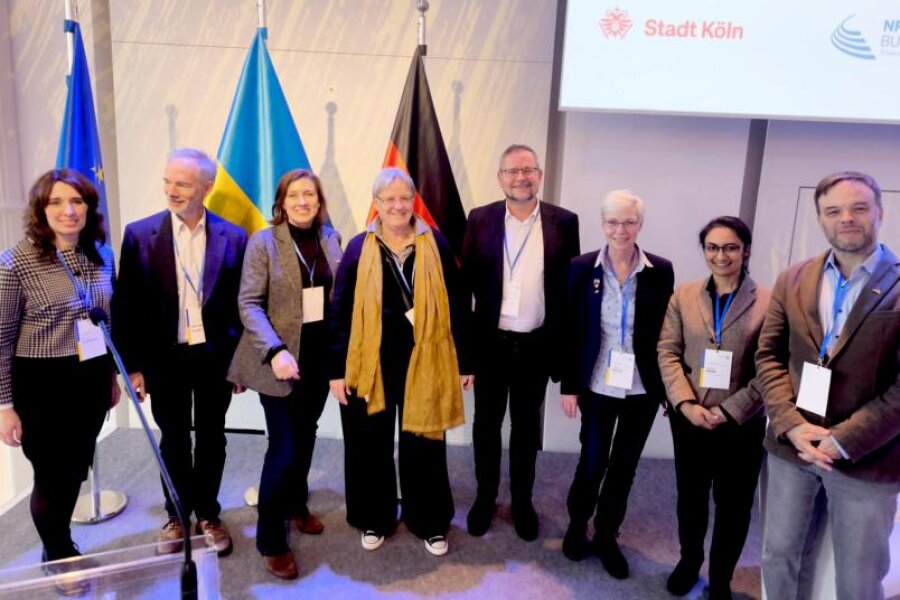UA Ruhr News Center
26. 11. 2024
Support for universities in Ukraine
The University Alliance Ruhr's DniPRONrw project will receive 100,000 euros in funding from the NRW Ministry of Culture and Science from 2025.
The Dnipropetrovsk Oblast lies around 400 kilometers south-east of the capital Kyiv. Like the whole of Ukraine, NRW's Ukrainian partner region has been struggling with the effects of the Russian war of aggression for 1,000 days. The University Alliance Ruhr, led by Prof. Dr. Björn Rothstein from the Institute of German Studies at Ruhr-Universität and Elena Resch from the UA Ruhr Liaison Office for Eastern Europe/Central Asia, applied to the Ministry of Culture and Science for funding for the “DniPRONrw” project with an application to support the universities there and their teaching staff.
On November 18, 2024, NRW Minister Ina Brandes announced at the Ukraine Conference that the project would be funded with around 100,000 euros from 2025. “North Rhine-Westphalia stands by Ukraine! [...] Under the leadership of Ruhr-Universität Bochum, the University Alliance Ruhr has developed a platform through which academics and students in Ukraine can access teaching content and materials. In this way, we are improving the everyday life of local universities and research institutions in a very practical way,” says Brandes.
A contribution to reconstruction
“As the core of a functioning education and research system, universities play a central role in the reconstruction and development of Ukraine.
Together with our partners in the University Alliance Ruhr, we want to make a future-oriented and sustainable contribution to maintaining and expanding Ukraine's academic potential and actively support the reconstruction of the academic system,” says Prof. Dr. Kornelia Freitag, Vice-Rector for Teaching and Studies at Ruhr-Universität.
With DniPRONrw, the University Alliance Ruhr wants to make a concrete contribution to rebuilding teaching programs and structures at universities in the Dnipro region. “We will provide training and teaching opportunities to close the gaps left by the loss of staff due to the war and thus relieve the burden on teaching staff at Ukrainian universities,” says Björn Rothstein.
The DniPRONrw project
In the DniPRONrw project, Ukrainian lecturers are given access to digitally available courses from the participating UA Ruhr partner universities and can use and further develop them; their students can have courses from the UA Ruhr credited to their studies as digital guest students. Together with the Ukrainian partners, the aim is to discuss how AI and freeware can be used to support teaching. The exchange of digital courses within the participating Ukrainian universities will also be promoted.
Drawing on existing networks
The fact that the UA Ruhr already has proven expertise and experience in academic cooperation with Eastern Europe, especially Ukraine, through its Slavic and historical research and teaching on Eastern Europe and the UA Ruhr Liaison Office for Eastern Europe/Central Asia, will benefit the project.
“DniPRONrw can draw on established German-Ukrainian networks - such as the Donetsk-Vinnitsa-Essen-Bochum partnership, the cooperation projects Intercultural German Learning and Teaching or Ukraine Peer (up!), teacher training through digi-Fellowships or cooperation with the Ukrainian German Teachers' and Germanists' Association,” says Elena Resch, Head of the Liaison Office for Eastern Europe/Central Asia. The funding of the DniPRONrw project is therefore not only an incentive not to let up in our support for Ukraine, but also a recognition of the exemplary commitment of Ruhr-Universität and its UA-Ruhr partners.

Support for universities in Ukraine
The funding approval for the UARuhr project DniPRONrw was announced at the Ukraine conference of the state government of North Rhine-Westphalia on November 18.
©Land NRW, Marius Becker

Support for universities in Ukraine
Happy about the funding (from left): Dr. Iryna Kompanets (RUB), Prof. Dr. Wolfgang Sonne (TU Dortmund), Elena Resch (Liaison Office UA Ruhr OEZA), Prof. Dr. Barbara Welzel (TU Dortmund), Prof. Dr. Matthias Epple (UDE), Prof. Dr. Kornelia Freitag (RUB), Reena James (RUB) and Prof. Dr. Björn Rothstein (RUB).
©Elena Resch


